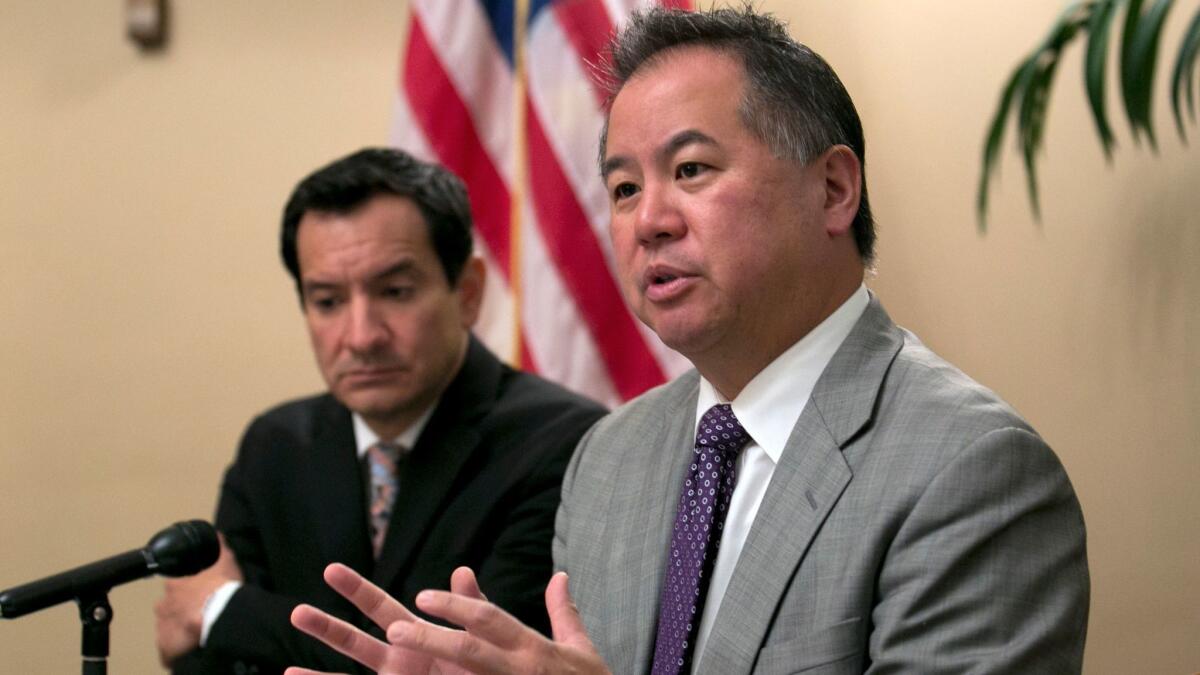Millions of Californians are eligible to clear their criminal records, but it takes time and money. Make it automatic

- Share via
One of the bedrock principles of the criminal justice system is that, with limited exceptions, offenders return to society as full members with all rights and privileges restored after their punishment is completed.
And one of the basic motivating factors for the criminal justice reform movement is the fact that the promise of a new start is often empty. Some forms of punishment continue forever.
To understand why, look no further than the host of background-check companies that will, for a price, hunt down records of long-ago convictions or arrests to help make their clients nervous about would-be employees or tenants. Never mind that studies into recidivism show that after a few years people with low-level crimes on their records are no more likely to commit new crimes than anyone else.
So much for restoration of rights. Having a criminal record, even if it’s limited to low-level offenses, can prevent a former offender from renting an apartment, getting a job, earning a professional license or gaining admission to a university. It could separate children and parents, for example in child custody proceedings. It could result in noncitizens being deported. It might also prevent a parent from fully participating in a son’s or daughter’s life by, for example, coaching a soccer team or chaperoning a field trip.
The lost productivity and diminished career paths cost the economy, and the numerous impediments to full reentry encourage recidivism, leading to more crime and victimization.
Current law gives people convicted of low-level crimes a way to avoid this trap: They can apply to have their records expunged. Unless a prosecutor or probation agency presents a judge with a good reason to keep a person’s criminal record available to landlords, employers and the like, records are cleared for most purposes. The former offender gets on with life unburdened by a criminal record. That’s the way it’s supposed to be for everybody who has served his or her time for those sorts of crimes and is ready to move on.
But very few people ever actually clear their records. Many don’t know that doing so is possible, so they don’t apply. Of those who do know, many can’t afford the several thousand dollars it may take to hire a lawyer, or can’t take the time away from work or family to appear in court.
Expungement is costly for the public as well. Each application costs nearly $4,000 to process.
When California ended the state’s ban on recreational marijuana, people who’d been convicted of laws the voters had just repealed could petition the court to clear their records, but the process was time-consuming and costly for them and for the courts. Lawmakers came to see that it made more sense to just automatically wipe those records clean, without petitions, hearings or deadlines. A bill to do that was signed into law last year.
Now lawmakers have in front of them AB 1076, which would automatically clear records of all low-level crimes for people who already are eligible for expungement under existing law. The facts establishing eligibility would be determined by the attorney general and referred to the court for action.
It’s a good bill and deserves passage. Its reach is modest. It would seal most records of low-level convictions and keep them out of the background checks that private companies provide for employers and landlords. Prosecutors and probation officers who object in the case of any particular offender could present their arguments in court and prevent sealing if the judge agrees. People who continue committing crimes would be ineligible.
It would also seal records of arrests that were not followed by criminal proceedings or that resulted in diversion programs.
But police, prosecutors and courts, the FBI and the state Department of Justice would retain access to all rap sheets, including all expunged arrests and convictions.
The bill continues the smart trend away from lifelong criminalization. For example, in recent years California finally got rid of the foolish, counterproductive rule that made people with criminal histories ineligible for food stamps and some other forms of public assistance. By forcing some people who were returning from jail to keep living on the margins, it served only to promote recidivism.
That’s the kind of thing we should be trying to prevent, not perpetuate. Millions of Californians have criminal records that limit their ability to improve their own lives and their families’. Many are eligible to clear their records. So let’s clear them and make criminal punishment work the way it was always supposed to, by allowing it to end on time.
More to Read
A cure for the common opinion
Get thought-provoking perspectives with our weekly newsletter.
You may occasionally receive promotional content from the Los Angeles Times.









